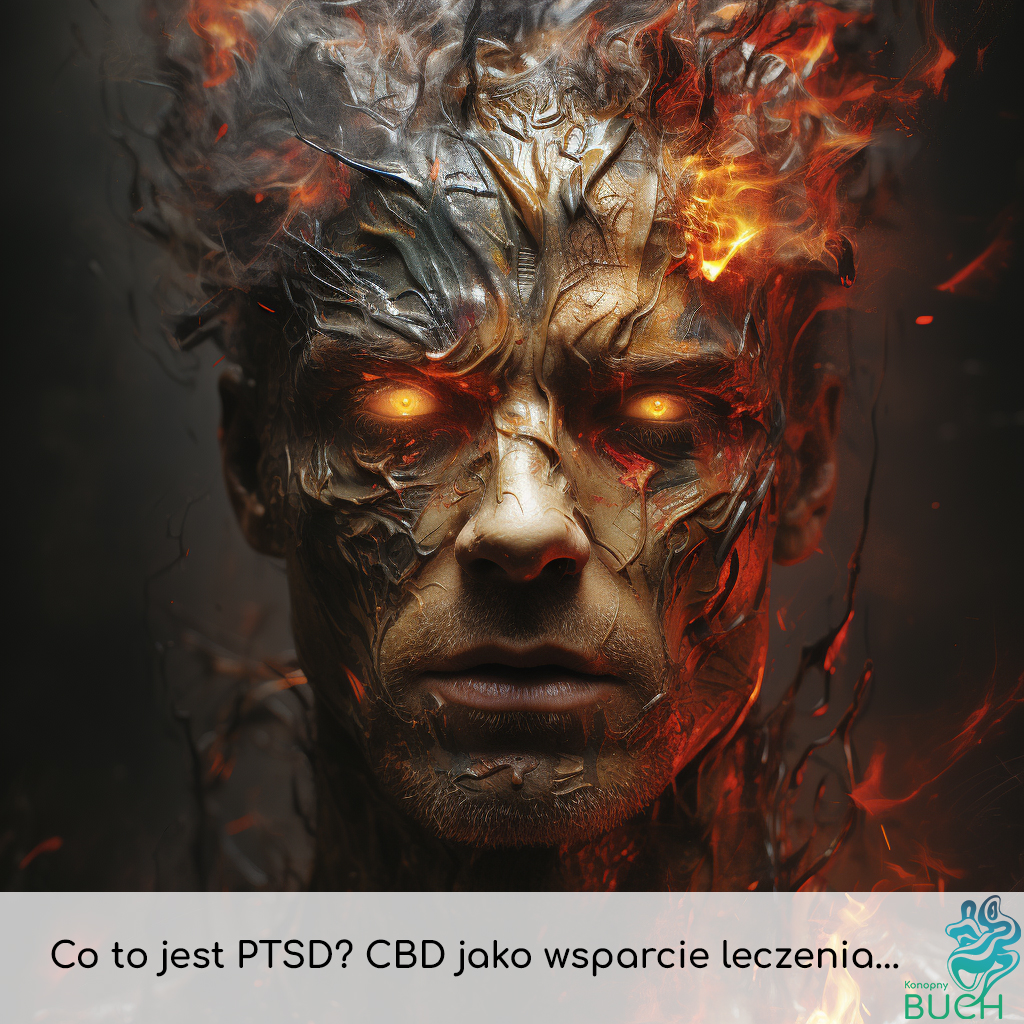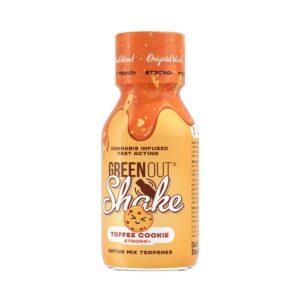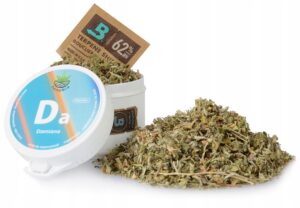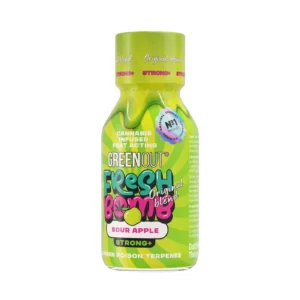Table of contents
Post Traumatic Stress Disorder (PTSD) is a syndrome of symptoms that develop in about 20% people after a traumatic experience. It is diagnosed in people whose symptoms persist more than a month after the traumatic event. The mainstay of treatment for PTSD is psychotherapy, often combined with pharmacotherapy (antidepressants and anti-anxiety drugs). Hemp cannabinoids, including CBD, can support treatment of post-traumatic stress disorder.
What is trauma?
Trauma is an event in which a person experiences extreme stress, resulting from fear for his or her health and life. According to the American Psychological Association's definition, a traumatic event results in experiencing significant levels of fear, helplessness, dissociation, confusion or other emotions that interfere with normal functioning and are strong enough to cause long-term consequences for a person's life, sense of security, outlook on the world and self.
There are two types of trauma:
- Type One Trauma: a single, extremely stressful event that can result in post-traumatic stress disorder (PTSD).
- Type two trauma - relational trauma: repeated, highly stressful events, most often occurring in a close relationship or daily functioning. Type two traumas include prolonged exposure to physical violence, psychological abuse, emotional abuse and neglect, or sexual abuse. People exposed to this type of trauma experience other consequences, e.g.: they may develop personality disorders, dissociative disorders, the so-called "complex PTSD", the diagnosis and treatment of which is different from that of PTSD.
Not every person who has experienced a traumatic event will develop PTSD. Immediately following an extreme 30% situation, people experience an acute stress response (ASR). ASR symptoms usually resolve on their own within days of a single trauma if the person is in a safe, supportive environment. PTSD develops in about 20% people after a traumatic experience and can be diagnosed if symptoms persist for more than a month and have a major impact on their daily functioning.
What experiences can PTSD occur after?
Initially, PTSD was diagnosed only in soldiers returning from the front. The syndrome of symptoms was sometimes called "soldier's heartache" during the Civil War or "veteran's fatigue" during World War I. As psychiatry and psychology and diagnostic methods developed, post-traumatic stress disorder began to be discussed in cases of people who had experienced other extremely stressful events.
Events that, according to current knowledge, can trigger PTSD:
- Rape (49%),*.
- physical violence, assault (32%),
- traffic accidents (16.8%),
- Child life-threatening (10.4%).
- Being a witness to the above / above affected a loved one (7.3%),
- natural disasters (3.8%).
(*the percentage of people who may experience post-traumatic stress disorder after a given experience).
In each of the aforementioned cases, there is an extreme experience, causing the person to feel that his life and bodily integrity are at risk. The person experiences extreme stress that exceeds that person's emotional capacity to cope.
Diagnosing PTSD according to the DSM-5
DSM-5 (Diagnostic and Statistical Manual of Mental Disorders) is the current classification of mental disorders American Psychiatric Association. According to it, post-traumatic stress can be diagnosed when the following symptoms appear in a person after a traumatic experience:
- poned experiencing a traumatic situation (min. 1 of the following):
- intrusive memories,
- dreams related to the event,
- flashbacks,
- Intense, prolonged stress response to factors that recall the event (including physiological).
- Persistent, relentless avoidance of thoughts, feelings, places, conversations related to the event, situations and people associated with the event, difficulty recalling the circumstances of the traumatic situation, isolation, alienation, a sense of having no future,
- Hyperactivity (at least 2 symptoms from the list): high alertness, anxiety, sleep disturbances, concentration disorders, irritability, anger outbursts,
- symptoms disrupt a person's functioning,
- symptoms are not related to psychoactive substance use,
- optional: depersonalization, derealization.
Davidson Trauma Scale - diagnosing PTSD
The Davidson Trauma Scale, developed in the late 1990s, is a questionnaire tool that helps psychiatrists and psychologists assess the extent of trauma in people after experiencing trauma. The scale is used for an initial assessment of psychological state, which helps select appropriate therapeutic management.
CBD as support for PTSD treatment
Hemp cannabinoids, including CBD, exhibit a number of properties that can support therapy for traumatized individuals. These include:
- regulating diurnal rhythm, facilitating falling asleep,
- mood regulation,
- anti-anxiety and calming properties,
- Supporting the regeneration of the body,
- improvement of appetite,
- Support for processes related to remembering and processing memories,
- stress relief.
Hemp cannabinoids are now the subject of scientific research around the world, with scientists recognizing the great potential of hemp medicine in somatic diseases and mental disorders. Already, medical cannabis is being prescribed to patients experiencing post-traumatic stress disorder, anxiety, depression or insomnia.
What is PTSD and what experiences can cause it?
PTSD - post-traumatic stress disorder - is a syndrome of symptoms that develops in some people (about 20%) after experiencing trauma. It was originally observed in soldiers returning from the front lines. As diagnostic methods developed, post-traumatic stress began to be diagnosed in people after other experiences causing trauma/trauma of similar intensity. This refers to situations in which a person experiences extremely severe stress that exceeds his or her coping abilities, feeling that his or her life and bodily integrity are at risk.
Traumatic situations that can trigger PTSD now include sexual violence, physical violence, assault, traffic accidents, natural disasters, threats to the life of a child or other loved one, or being a witness to all of the aforementioned situations that involve other people. PTSD develops most often in people after experiencing rape (49% people with such experience) and physical violence/assault (32%).
Importantly, PTSD is distinguished from ASR - acute stress reaction. Both syndromes have similar symptoms, but ASR persists for up to a month after the traumatic event and subsides spontaneously if the person experiencing it is in a safe environment. After this time, it is referred to as PTSD.
PTSD according to the American Psychiatric Association:
According to the DSM-5 diagnostic criteria, PTSD can be diagnosed if a person experiences a traumatic event for more than a month after experiencing it:
- re-experiencing the event:
- intrusive memories,
- dreams related to the event,
- flashbacks,
- Intense stress reactions (psychological and physiological) to factors reminiscent of the event,
- persistent avoidance of thoughts, feelings, places associated with the event, avoidance of conversations about it and people and situations associated with it, isolation, alienation, a sense of having no future,
- Sleep disorders, concentration disorders, outbursts of anger, timidity, vigilance,
In PTSD, these symptoms disrupt a person's functioning, persist for more than a month and are not related to psychoactive substance use. They may be accompanied by feelings of derealization and depersonalization.
Psychotherapy and pharmacotherapy - treatment of PTSD
Psychotherapy is one of the primary treatments for people who suffer from PTSD. With the development of trauma research, psychotraumatology or crisis intervention in psychology, a number of therapeutic approaches targeting traumatized people have emerged.
In most of them, psychologists assume that the trauma freezes the emotions and thoughts associated with the event, so people experiencing PTSD are unable to gain distance from it and relive it over and over again. The goal of psychotherapy may be to process the traumatic event in consciousness and create distance from it so that it no longer affects a person's life so intensely.
Pharmacotherapy is often based on antidepressants (e.g., from the SSRI group), which help control depressive and anxiety symptoms. Medications from the benzodiazepine group may also be used on an ad hoc basis if symptoms are severe.
Medical hemp seed has been approved as one of the methods to support PTSD psychotherapy in many countries around the world. The following properties of cannabis in particular are taken into account in scientific studies on the subject:
- anti-anxiety effects,
- Regulation of sleep and wakefulness rhythms,
- Regulation of processes involved in remembering and processing memories,
- Alleviating intrusive thoughts of trauma and flashbacks.
Selected studies on the use of dried hemp in PTSD
- In a study conducted with war veterans, a statistically significant group showed an alleviation of symptoms such as anxiety, fear and insomnia. Under the influence of cannabinoids, the subjects were better able to cope with difficult memories and emotions.
- In another study, researchers used a well-being reporting app. Participants in the study - people with PTSD - provided researchers with information about their symptoms during treatment dried hemp. Approximately 12,000 reports from 400 subjects over 2.5 years were analyzed. Immediately after taking the drug, 98% subjects experienced less intrusive thoughts of trauma, 97% felt less sensitive, anxiety and worry levels decreased in 93% subjects, while 92% experienced fewer flashbacks. The researchers noted that these effects may cease after cannabis therapy, pointing to the need to repeat the study under more controlled conditions and with subjects undergoing concurrent psychotherapy.
Scientists see therapeutic potential CBD and other hemp cannabinoids in the treatment of post-traumatic stress disorder, however, point to the need for more studies with a different, more controlled course. Such an approach could lead to the development of cannabis-based drugs to support the treatment of psychiatric disorders, including PTSD.









